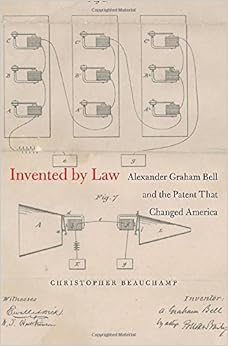Episode 093: Interview with Prof. Christopher Beauchamp.mp3
In this interview. Brooklyn Law School’s Associate Professor of Law  Christopher Beauchamp speaks about his first book, Invented by Law: Alexander Graham Bell and the Patent That Changed America (Call# KF 3116.B43 2015). Published by Harvard University Press, the book explores questions of ownership and legal power raised by the invention of the telephone, and tells of a forgotten history with wide relevance for today’s patent crisis. Using the invention of the telephone in 1876 as one of the great touchstones of American technological achievement, Beauchamp sheds new light on that history, and examines the legal battles that raged over Bell’s telephone patent, perhaps the most consequential patent right ever granted. Prof. Beauchamp shows that the telephone was as much a creation of American law as of scientific innovation.
Christopher Beauchamp speaks about his first book, Invented by Law: Alexander Graham Bell and the Patent That Changed America (Call# KF 3116.B43 2015). Published by Harvard University Press, the book explores questions of ownership and legal power raised by the invention of the telephone, and tells of a forgotten history with wide relevance for today’s patent crisis. Using the invention of the telephone in 1876 as one of the great touchstones of American technological achievement, Beauchamp sheds new light on that history, and examines the legal battles that raged over Bell’s telephone patent, perhaps the most consequential patent right ever granted. Prof. Beauchamp shows that the telephone was as much a creation of American law as of scientific innovation.
On March 7, 1876, the U.S. Patent & Trademark Office approved Alexander Graham Bell’s patent for Improvement of Telegraphy (No. 174,465) in an unusually fast approval process, with three applications hand-delivered by Bell’s lawyer on February 14, mere hours before a competing application was submitted by engineer Elisha Gray. Bell’s legal maneuvering strongly suggested that an unknown informant within the PTO was assisting efforts to beat Gray to the telephone patent. Subsequent litigation reached the U.S. Supreme Court twice in 1888, first with The Telephone Cases (126 U.S. 1), and then with United States v. American Bell Telephone Corp. (128 U.S. 315). Prof. Beauchamp untangles these lawsuits and analyzes their aftermath in a way that should appeal to both intellectual property experts and novices.
Reconstructing the world of nineteenth-century patent law, replete with inventors, capitalists, and charlatans, where rival claimants and political maneuvering loomed large in the contests that erupted over new technologies, the book challenges the popular myth of Bell as the telephone’s sole inventor, exposing that story’s origins in the arguments advanced by Bell’s lawyers. More than anyone else, it was the courts that anointed Bell father of the telephone, granting him a patent monopoly that decisively shaped the American telecommunications industry for a century to come. Prof. Beauchamp investigates the sources of Bell’s legal primacy in the United States, and looks across the Atlantic to Britain to consider how another legal system handled the same technology in very different ways.
